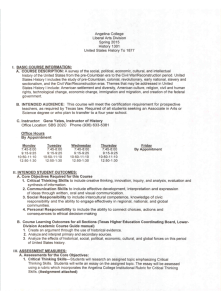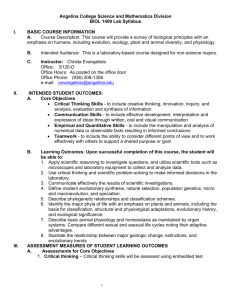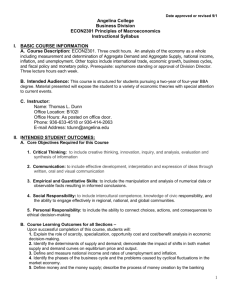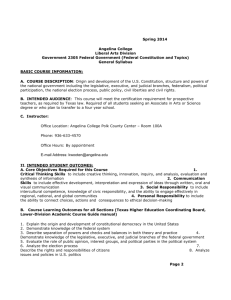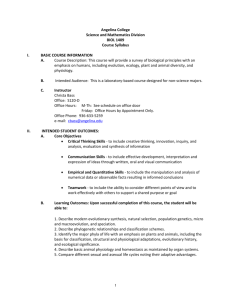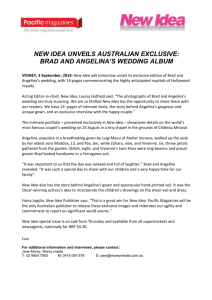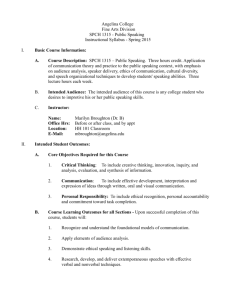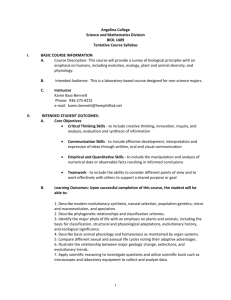Syllabus - Angelina College
advertisement
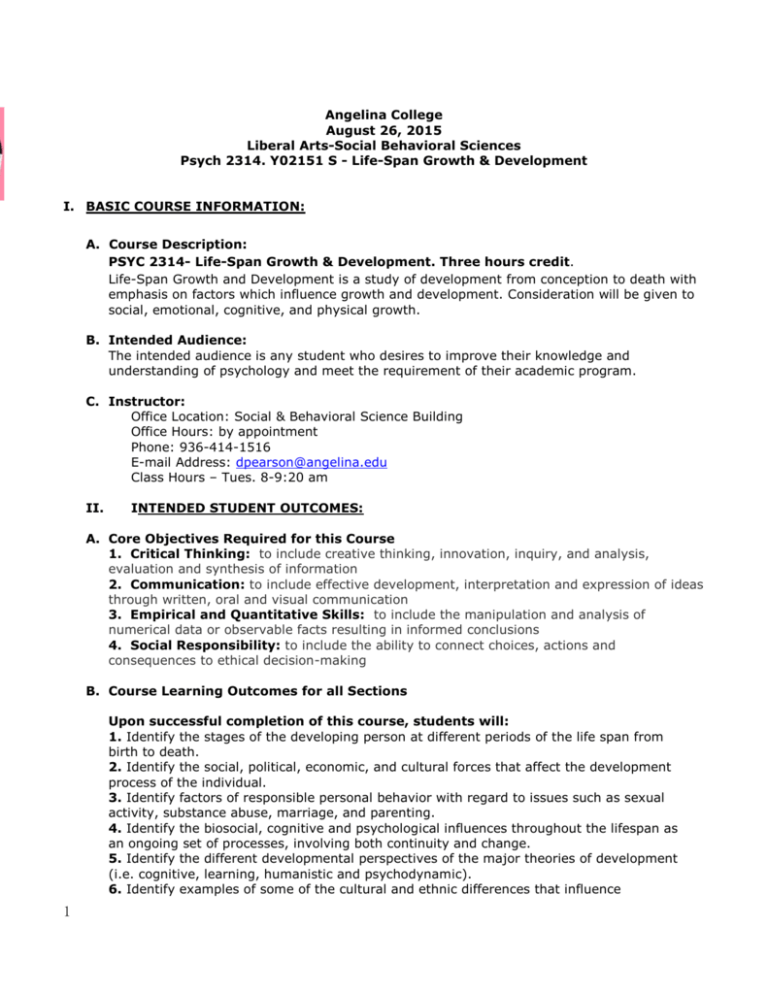
Angelina College August 26, 2015 Liberal Arts-Social Behavioral Sciences Psych 2314. Y02151 S - Life-Span Growth & Development I. BASIC COURSE INFORMATION: A. Course Description: PSYC 2314- Life-Span Growth & Development. Three hours credit. Life-Span Growth and Development is a study of development from conception to death with emphasis on factors which influence growth and development. Consideration will be given to social, emotional, cognitive, and physical growth. B. Intended Audience: The intended audience is any student who desires to improve their knowledge and understanding of psychology and meet the requirement of their academic program. C. Instructor: Office Location: Social & Behavioral Science Building Office Hours: by appointment Phone: 936-414-1516 E-mail Address: dpearson@angelina.edu Class Hours – Tues. 8-9:20 am II. INTENDED STUDENT OUTCOMES: A. Core Objectives Required for this Course 1. Critical Thinking: to include creative thinking, innovation, inquiry, and analysis, evaluation and synthesis of information 2. Communication: to include effective development, interpretation and expression of ideas through written, oral and visual communication 3. Empirical and Quantitative Skills: to include the manipulation and analysis of numerical data or observable facts resulting in informed conclusions 4. Social Responsibility: to include the ability to connect choices, actions and consequences to ethical decision-making B. Course Learning Outcomes for all Sections Upon successful completion of this course, students will: 1. Identify the stages of the developing person at different periods of the life span from birth to death. 2. Identify the social, political, economic, and cultural forces that affect the development process of the individual. 3. Identify factors of responsible personal behavior with regard to issues such as sexual activity, substance abuse, marriage, and parenting. 4. Identify the biosocial, cognitive and psychological influences throughout the lifespan as an ongoing set of processes, involving both continuity and change. 5. Identify the different developmental perspectives of the major theories of development (i.e. cognitive, learning, humanistic and psychodynamic). 6. Identify examples of some of the cultural and ethnic differences that influence 1 development throughout the lifespan. 7. Demonstrate critical thinking and cognitive processing abilities by careful, thoughtful reading and clear written expression through written assignments and class interaction. 8. Identify the various causes or reasons for disturbances in the developmental process. III. ASSESSMENT MEASURES A. Assessments for the Core Objectives: 1. Critical Thinking: Students will demonstrate the ability to think creatively, to innovate, inquire, and analyze, evaluate and synthesize information. Outcome will be assessed using the Angelina College standardized rubric. 2. Communication: Students will demonstrate the ability to effectively develop, interpret and express ideas through written, oral and visual communication. Outcome will be assessed using the Angelina College standardized rubric. 3. Empirical and Quantitative Skills: Students will demonstrate the ability to manipulate and to analyze numerical data or observable facts resulting in informed conclusions. Outcome will be assessed using the Angelina College standardized rubric. 4. Social Responsibility: Students will demonstrate the ability to connect choices, actions and consequences to ethical decision-making. Outcome will be assessed using the Angelina College standardized rubric. B. Assessments for Course Learning Outcomes Upon successful completion of this course, students will: 1. Students will demonstrate the ability to identify the stages of the developing person at different periods of the life span from birth to death. Outcome will be assessed using the Angelina College standardized rubric. 2. Students will demonstrate the ability to identify the social, political, economic, and cultural forces that affect the development process of the individual. Outcome will be assessed using the Angelina College standardized rubric. 3. Students will demonstrate the ability to identify factors of responsible personal behavior with regard to issues such as sexual activity, substance abuse, marriage, and parenting. Outcome will be assessed using the Angelina College standardized rubric. 4. Students will demonstrate the ability to identify the biosocial, cognitive and psychological influences throughout the lifespan as an ongoing set of processes, involving both continuity and change. Outcome will be assessed using the Angelina College standardized rubric. 5. Students will demonstrate the ability to identify the different developmental perspectives of the major theories of development (i.e. cognitive, learning, humanistic and psychodynamic). Outcome will be assessed using the Angelina College standardized rubric. 6. Students will demonstrate the ability to identify examples of some of the cultural and ethnic differences that influence development throughout the lifespan. Outcome will be assessed using the Angelina College standardized rubric. 7. Students will demonstrate critical thinking and cognitive processing abilities by careful, thoughtful reading and clear written expression through written assignments and class interaction. Outcome will be assessed using the Angelina College standardized rubric. 8. Students will demonstrate the ability to identify the various causes or reasons for disturbances in the developmental process. Outcome will be assessed using the Angelina College standardized rubric. 2 IV. INSTRUCTIONAL PROCEDURES: A. Methods used to teach this class will include lectures, discussion, Web based instruction, Exams and written assignments. V. COURSE REQUIREMENTS AND POLICIES: A. Required Textbook: Santrock, John W. A Topical Approach to Life-Span Development 7th Edition McGraw Hill Publishing B. Scantrons -50 question scantron required for each Exam Tests & Assignments Autobiography 20 points 4 Major Exams at 100 points each 400 10 Quizzes at 10 points each 100 4 Critical Thinking Assignments at 50 points each 200 Total possible points =720 The Assignments are critical thinking exercises. Each assignment is required to be typed, have a title/cover page, and at least 1 full page of content. Topics will be discussed in class. B. Course Policies – This course conforms to the policies of Angelina College as stated in the Angelina College Handbook. 1. Academic Assistance – If you have a disability (as cited in Section 504 of the Rehabilitation Act of 1973 or Title II of the Americans with Disabilities Act of 1990) that may affect your participation in this class, you should see Karen Bowser, Room 208 of the Student Center. At a post-secondary institution, you must self-identify as a person with a disability; Ms. Bowser will assist you with the necessary information to do so. To report any complaints of discrimination related to disability, you should contact Dr. Patricia McKenzie, Administration Building, Room 105 or 936-633-5201. 2. Attendance – Attendance is required as per Angelina College Policy and will be recorded every day. Any student with three (3) consecutive absences of four (4) cumulative absences may be dropped from the class. Records will be turned in to the academic dean at the end of the semester. Do not assume that nonattendance in class will always result in an instructor drop. You must officially drop a class or risk receiving an F. This is official Angelina College Policy. 3 3. Plagiarism/Cheating- Plagiarism (Intentional or Unintentional), Collusion, or Cheating (in any form) will result in an F in the course. Each student’s work must be their own original work. Additional Policies Established by the Instructor 1. It is to be clearly understood that the student is responsible for fulfilling all assignments on time. Any work missed will be assigned a 0. 2. Instructor is not in any way responsible for advising a student of assignments or tests missed during an absence of student. It is the responsibility of student to find out what transpired in the class during the absence. There is no excuse for missing assignments or exams. If student is absent from class on the day assignment is due or Exam is given, the instructor is under no obligation to allow make up. It is to the student’s advantage to inform the instructor as soon as possible of any situation that prevents student from following the instructor’s time & due dates for all course work. 3. Cell phones, pagers, recorders, tablets, iPads, iPods, or other similar devices are NOT allowed in the classroom. There is ZERO tolerance for this unacceptable behavior in the classroom. 4. RESPECT for fellow classmates & the instructor is expected at all times. 5. No eating in classroom. 6. Visitors are not allowed in class without permission from the instructor. 7. It is appropriate to talk in response to questions or statements made during class, but it is not appropriate to conduct social conversations or speak out when the instructor or another student is speaking. 8. Disruptive behavior will not be tolerated. 9. Academic Freedom The college experience frequently questions, researches, evaluates, and assesses controversial issues. The classroom may serve as a forum for the presentation of a variety of ideas, none of which are intended injuriously. VI. COURSE OUTLINE: Description of the Course Activities including due dates, schedules, and deadlines. Exam 1 Chapter Chapter Chapter Chapter 1: 2: 3: 4: Introduction Biological Beginnings Physical development and biological Aging Health Exam Date: September 22, 2015 4 Exam 2 Chapter Chapter Chapter Chapter 5: 6: 7: 8: Motor Sensory and Perceptual Development Cognitive Developmental Approaches Information Processing Intelligence Exam Date: October 20, 2015 Exam 3 Chapter Chapter Chapter Chapter 9: Language Development 10: Emotional development and Attachment 11: The self, Identity, and Personality 12: Gender and Sexuality Exam Date: November 17, 2015 Exam 4 Chapter Chapter Chapter Chapter Chapter 13: 14: 15: 16: 17: Moral Development, Values, and Religion Families, Lifestyles, and Parenting Peers and the Sociocultural World Schools, Achievement, and Work Death, Dying, and Grieving Final Exam Date: December 14, 2015 VII. EVALUATION AND GRADING: A. Grading Criteria Grading Scale for Final Class Letter Grade: 648-720 points =A 576-647 points =B 504-575 points =C 432-503 points =D 431 and below =F 1. The final class letter grade will be based on total points accumulated from assignments, quizzes, and Exams. 2. Exams and assignments will be discussed individually with students upon request. The instructor will be available by appointment. VIII. Syllabus Modification The instructor may modify the provisions of the syllabus to meet individual class needs by informing the class in advance as to the changes being made. 5
